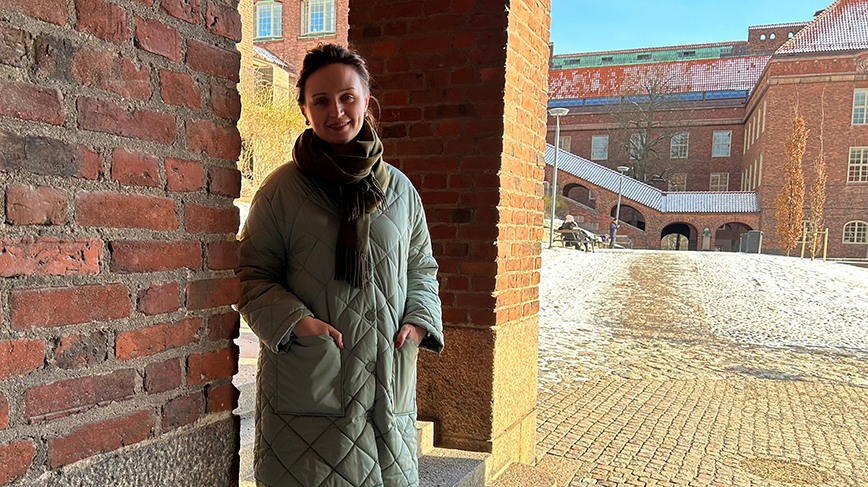“To carry on researching has been my lifeline”

As the sirens howled, the windows in her apartment smashed and the university was bombed, Krystyna Heti and her mother fled Ukraine in early March last year.
She is now a researcher at KTH in the field of learning.
“It’s really nice to be able to breathe again in the academic environment. I’m comparing the teaching system in Sweden and Ukraine in certain areas of engineering. I just had to jump in at the deep end, even though everything was new. Being able to carry on researching has been my lifeline.”
Heti was working as an associate professor in mechanics and aerospace engineering department and heading the department of international students studies and mobility at Oles Honchar Dnipro National University. After ten months in Sweden and five different refugee centres, she could finally start at KTH.
Supporting students in Ukraine
“At the centre, I taught Ukrainian children mathematics as a volunteer. But starting at KTH in my chosen profession was something else entirely.”
In the evenings and at weekends she also supports students online at her old university.
“It could be one way of saving a few young men from the war for a while.”
There are big differences in how teaching in technical subjects is conducted. One thing that has struck her about KTH is the open atmosphere between students and teachers, the number of group projects and the high standard.
Close contact with her family
She can also compare to several other universities where she has been on exchange in South Korea, Turkey and Portugal, for example.
Her route to Sweden was via Poland. Some of the aspects that really surprised her were how friendly people were, being able to drink the tap water, and the fact that the electricity worked constantly.
“I thought they were joking with me about the water at the refugee centre.”
The war is with her the whole time, and while she may be in Sweden physically, her thoughts are constantly with her family and friends in Ukraine about whom she receives regular updates. She also has a few cousins in Russia. Many of her friends and colleagues are in the war.
“Sitting in my apartment crying wasn’t helping, and what was I waiting for anyway? To find out if I’d wake up the next day or not? At first I was in complete shock. Then I decided that even though they’d broken my heart, they’re not going to break my mind and my ability to think as well.”
Heti’s first day at KTH just happened to be her birthday. Clearly emotional, she says that her department had made her a birthday cake. Her spell at KTH is currently set at ten months.
For the future, she hopes that the, in her words, ‘unstoppable’ Ukraine will be able to resist the war, and that everyone will be able to return to an everyday life and reality free of violence, and start to rebuild and even dream about the future.
Studying cybersecurity
A week or so later I meet Yuliia Bahlai, one of the students who has come to KTH in the past year to continue her studies in cyber security.
Her university was bombed and her hometown, close to the Russian border, was invaded.
In the autumn she was able to start studying at KTH, and she was struck by the beauty of all the old buildings on campus.
She has managed to gain top grades for her courses here, while also distance learning at her home university. Other key differences are that the education is free here, and the equipment far more modern.
Cyber security is very much a relevant area.
“After all, the invasion began when the government’s systems were hacked and attacked.”
Bahlai is currently taking a break from her studies at KTH, and working as a trainee at a company that helps Ukrainian women in engineering.
Text and photo: Jill Klackenberg
